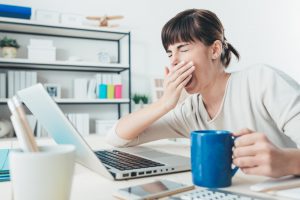Posted on Wednesday, March 24th, 2021 at 11:37 pm

Why Do I Wake Up Feeling Tired?
The simple answer to this question is that you are getting poor or inadequate sleep. However, figuring out why you are not getting adequate rest can be challenging. Unfortunately, there can be a wide range of causes, including poor sleep practices, lifestyle factors, and undiagnosed sleep disorders.
Let’s start with the basics. The National Sleep Foundation recommends that those who wake up feeling tired the next day examine their “sleep hygiene.” Sleep hygiene is the practice of putting yourself in the best possible position to get a restful and relaxing night’s sleep. Good sleep hygiene practices include:
- Follow a nightly routine
- Keep your bedtime and wake time consistent, even on the weekends
- Set aside 30 minutes of “wind-down” time each evening
- Do not use blue-light-emitting devices 30 to 60 minutes before bed (phones, tablets, laptops)
- Dim the lights
- Create a relaxing and calming bedroom environment
- Relax. Try meditation, mindfulness, or breathing exercises
Lifestyle changes can also help make a dramatic improvement to the quality of sleep you get on a nightly basis. Even small changes can make a big impact on the quality of your sleep. These changes can include:
- Get active and exercise regularly
- Make sure you get enough exposure to natural light
- Avoid eating heavy or fatty food before bed
- Avoid caffeine before bed
- Avoid alcohol before bed
While better sleep hygiene practices and lifestyle changes can help, some people still find that they don’t feel rested enough when they wake up. This may point to an undiagnosed sleep disorder that requires professional intervention to diagnose and treat. Conditions that could be disrupting your sleep may include:
- Sleep apnea
- Restless leg syndrome
- Snoring
- Insomnia
- Sleep paralysis
- Bruxism
What is Sleep Apnea?
Sleep apnea is a condition that occurs in almost 25 percent of men and 10 percent of women. It is a condition that impacts the way a person breathes while sleeping. During sleep, a person’s breathing may become interrupted or even stop altogether for periods of time.
This affects the quality of an individual’s sleep because when the person stops breathing ,their oxygen levels drop. Their heart rate may also drop during these episodes. A dip in oxygen levels and heart rate can cause the body to involuntarily startle itself awake. This can happen a few times to hundreds of times per night. This means that a person’s night-time sleep-cycle is incomplete. Signs of sleep apnea can include:
- Not feeling like you got enough sleep
- Snoring
- Gasping for air
- Waking up with a dry mouth
- Headaches
How Can Silent Night Therapy Help?
Sleep is one of the most important aspects of keeping healthy, both in mind and body. If you are constantly waking up feeling tired or like you didn’t get enough sleep, it is time to talk to a sleep professional.
At Silent Night Therapy, Dr. Brown and his team have been helping people improve their sleep and their health for almost 30 years. We have the experience and expertise to review your symptoms and medical history and get to the root cause of your sleep problems.
Too often, sleep disorders go undiagnosed. Being tired all day and waking up not feeling rested isn’t always a side-effect of our busy lives. It is not normal, and you can do something about it. Ready to get better sleep? Contact us today at 631-983-2463, and let’s put you on a path toward good quality sleep.